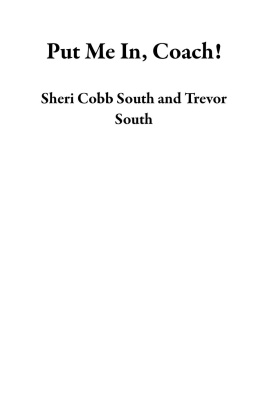
First published 2001 by Transaction Publishers
Published 2017 by Routledge
2 Park Square, Milton Park, Abingdon, Oxon OX14 4RN
711 Third Avenue, New York, NY 10017, USA
Routledge is an imprint of the Taylor & Francis Group, an informa business
Copyright 2001 by Taylor & Francis
All rights reserved. No part of this book may be reprinted or reproduced or utilised in any form or by any electronic, mechanical, or other means, now known or hereafter invented, including photocopying and recording, or in any information storage or retrieval system, without permission in writing from the publishers.
Notice:
Product or corporate names may be trademarks or registered trademarks, and are used only for identification and explanation without intent to infringe.
Library of Congress Catalog Number: 00-053257
Library of Congress Cataloging-in-Publication Data
Whats wrong with sociology? / edited with an introduction by Stephen Cole.
p. cm.
Includes bibliographical references.
ISBN 0-7658-0039-X (alk. paper)
1. Sociology. I. Cole, Stephen, 1941-.
HM585 .W53 2001
301dc21 00-053257
ISBN 13: 978-0-7658-0039-8 (hbk)
Contents
by Stephen Cole
by Stephen Cole
by Randall Collins
by Arthur L. Stinchcombe
by James A . Davis
by Howard S. Becker & William C . Rau
by Mayer N. Zald
by James B. Rule
by Harvey Molotch
by Peter L. Berger
by Maria Cole
by Richard B. Felson
by Seymour Martin Upset
by Ida Harper Simpson & Richard L. Simpson
by Joan Huber
by Paget Henry
by Carolyn Ellis & Arthur P. Bochner
Introduction
The Social Construction of Sociology
Stephen Cole
In some ways this is a very personal book; it represents my own views as to who would have interesting things to say on the problems currently facing the discipline of sociology and as to which already published articles dealing with this topic were worth reprinting. Eight of the chapters in this book were originally published in 1994 as a special issue of Sociological Forum, the journal of the Eastern Sociological Society, of which I was editor at the time. These are the chapters by S. Cole, Collins, Davis, Lipset, Molotch, Rule, the Simpsons, and Stinchcombe. One chapter, that by Zald, was an invited contribution to a follow-up discussion of the special issue appearing in the same journal. Two of the chapters, those by M. Cole and Ellis and Bochner are original essays which I commissioned for this book. The other chapters, those by Becker and Rau, Berger, Felson, Henry, and Huber were previously published articles. The essay by Henry was part of a special issue of Sociological Forum devoted to the views of African American sociologists on the current state of sociology which I commissioned when I was editor. The Huber essay was the Centennial Essay published in the American Journal of Sociology (AJS) in 1995. There were other people whom I asked to contribute to both the special issue and this volume who declined.
The many hundreds of other sociologists whom I might have asked to contribute would have, perhaps, written quite different essays stressing different themes. Many would have felt that there was nothing really wrong with sociology except that we were being treated poorly by university administrators and state governments. There are some sociologists who feel that the field has never been in better shape; that is not true of the people who wrote the essays in this volume nor does it represent my point of view.
Although this introduction and the essays in this collection are critical of the current state of sociology, this should not be taken as evidence for our disenchantment with the discipline. The authors whose essays are contained in this volume truly love the discipline of sociology and it is because of their strong commitment to the discipline that some of us are deeply concerned about what we see as current shortcomings in the discipline. Criticizing some aspects of the way in which sociology is currently practiced does not mean that we do not appreciate the good work which is currently being done by many sociologists or that we do not see the discipline as having great insights to add to our understanding of human behavior. These criticisms are offered in a constructive way with the hope that they will be of some value in overcoming some of what we see as problems existing in the discipline today.
My main work has been in the specialty of the sociology of science. My last monograph, Making Science: Between Nature and Society (1992) contained a detailed critique of a position which has now become dominant in the sociology of science social constructivism. Based upon a relativist epistemology, constructivists argue that there is no truth and rather than nature influencing what scientists come to believe as true, social processes among scientists influence how we come to define nature. In the course of thinking through whether the natural sciences are socially constructed, it occurred to me to ask whether sociology was completely socially constructed. What exactly would this mean? It would mean that what sociologists believe to be true about human behavior has very little to do with evidence from the empirical world; rather it is mostly a result of ideology, power, authority, and other social processes. I gradually came to believe that although this view was not an accurate depiction of the natural sciences it was a relatively accurate portrayal of sociology and I believe that the essays in this book offer much support for such a conclusion. The many friends and colleagues to whom I have shown prior drafts of this introduction have frequently asked whether there was something inherent in the discipline of sociology which made it necessary that it be socially constructed or could it operate more according to the principles of the natural sciences. My answer is that, of course, there is nothing inherent in sociology which makes it a socially constructed body of knowledge but that it is unlikely that the discipline would do what would be necessary for the current situation to change. What such changes would be will be outlined in the concluding section of this introduction.
Before beginning my discussion of the themes which run through the sixteen essays in this book, it is important to let the reader know exactly what are and what are not the aims of this book. First, it is important to recognize that the essays presented here are those of opinion. Thus, not every statement made in these essays or in this introduction is backed up with empirical evidence or a series of citations. In the introduction particularly I make some statements and reach some conclusions that are not based upon a systematic study of the field; but rather the views of the authors of the essays in this book and my own thirty plus years of experience. Opinion, of course, is more interesting if it is based upon evidence than if it comes out of the blue. And wherever possible the authors of the essays and I in the introduction attempt to cite examples or references which back up our opinions; but these are not journal articles of the type normally published in the American Sociological Review.












